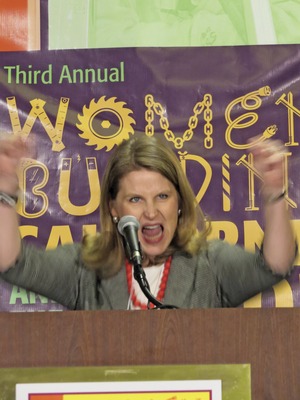By SUSAN EISENBERG
Thu, Apr. 04, 2013
Thirty-five years ago on April 7, President Jimmy Carter issued federal regulations that opened construction jobs and trade apprenticeships to women. Carter laid out a path that should have led to women holding 25 percent of the construction jobs by now. But we've barely gained a toehold.
Only 1.6 percent of carpenters, 1.8 percent of electricians, 1.3 percent of operating engineers, 2.9 percent of construction laborers and 2.5 percent of the overall trades work force are female, according to the latest reports from the Department of Labor.
Women like myself who entered apprenticeships in 1978 remember the robust recruitment, training and government oversight that made unions and contractors take us seriously. We believed the Department of Labor's "There's a future in it!" posters advertising apprenticeships to women, and we believed the government had our backs.
Then President Ronald Reagan reversed that momentum. His administration cut full-time employees at the Office of Federal Contract Compliance Programs by one-third and made it known that excluding women from a fair shot at careers in the trades carried little consequence. The effects are still felt today, as the compliance oversight agency operates with half the staffing that it had under Carter.
A woman walking onto a construction jobsite today may find herself time-traveled back to 1963, when it was legal to discriminate in hiring, promotion and layoffs.
It is not uncommon to hear of women who are carpenters or line workers being told on their first day by the foreman, "I will run you off of this job before this week is over."
The stories are remarkably similar across the country.
Tradeswomen have been locked in a porta-potty (or in an electric closet).
They have been "counted" in an apprenticeship program but not given adequate training - or sometimes not even sent out to a job.
Biased evaluations have derailed hard-earned careers.
Unsafe assignments intended to scare women into quitting have led to serious injuries or fatalities.
Tradeswomen have faced sexual assaults and even rapes on the job, and then have been advised to "forget about it" by a training director or business manager.
An industry that depends on the infusion of public dollars, tax breaks and other accommodations needs to practice fair employment, even when the perpetrator of discrimination and abuse is someone's friend or brother-in-law or long-term employee.
Recently, the construction industry has been adding new jobs at an accelerating rate - 150,000 in the past five months.
For women to share in these good jobs, actions need to be taken.
Two-tier training systems need to be combined into one that trains all apprentices for careers. This could be tracked by counting apprentices and journey-level workers as separate occupations.
Project Labor Agreements that ensure prevailing wages for workers need to include funded plans for fair hiring.
Job foremen and union stewards - not the victims - need to be responsible for ending discrimination on job sites.
The 1978 regulations need to be updated to match today's workforce. New regulations, expected two years ago, are now expected in October.
We've been waiting a long time for fairness on the construction site. President Obama, where do you stand?
ABOUT THE WRITER
Susan Eisenberg directs the On Equal Terms Project at Brandeis University's Women's Studies Research Center. Her touring mixed media art installation, "On Equal Terms," will exhibit Sept. 22-Oct. 20 at the Clemente Soto Velez Center in New York City. She wrote this for Progressive Media Project, a source of liberal commentary on domestic and international issues; it is affiliated with The Progressive magazine. Readers may write to the author at: Progressive Media Project, 409 East Main Street, Madison, Wis. 53703; email: pmproj@progressive.org; Web site: www.progressive.org. For information on PMP's funding, please visit http://www.progressive.org/pmpabout.html#anchorsupport.




